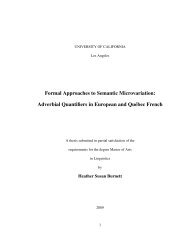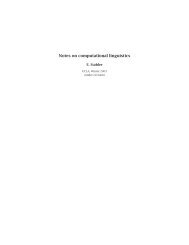A Grammar of Miya - UCLA Department of Linguistics
A Grammar of Miya - UCLA Department of Linguistics
A Grammar of Miya - UCLA Department of Linguistics
Create successful ePaper yourself
Turn your PDF publications into a flip-book with our unique Google optimized e-Paper software.
, i<br />
262<br />
bilkir, (pI) sgba kir<br />
b:l tlyad'i, (pI) sgba tlyiicfi<br />
b:l ndzahiy<br />
glti ba tably<br />
sg",m rna tlyam<br />
A <strong>Grammar</strong> <strong>of</strong> <strong>Miya</strong><br />
'thief' « akir 'theft'; cf. bra 'to stea!')<br />
'farmer' « atlyatii 'fanning'; cf. tlyatii' 'to farm')<br />
'poor person' « ndzahiy 'poverty'; cf. ndza 'to be poor')<br />
'sharp ax' « tahiy l4 'eating'; cf. Iii 'to eat')<br />
'razor' (lit. 'knife that shaves' < at/yam 'shaving';<br />
cf. tllima 'to shave')<br />
5.1.3. Statives. Stative attributives are expressed by balmalsaba with either a deverbal<br />
noun or a participle (4:§2.3, §2.1). Formally, those with participles are subject relatives<br />
(§5.2.1), i.e. 'seated man' = 'man who has sat down', while those with deverbal nouns<br />
are identical to the "one who does ... " phrases discussed in §5.1.2. In elicitation the<br />
structure with the deverbal noun and the one with the participle were sometimes given as<br />
equivalent in meaning, e.g.<br />
sgm ba tSggo (deverbal noun) = sgm b:l tSgguwso (participle)<br />
'seated man'<br />
There is probably some pragmatic difference, e.g. 'man who has sat down' vs. 'man who<br />
is seated/sitting' .<br />
Stative expressions may consist <strong>of</strong> intransitive verbs modifying their semantic subject<br />
or transitive verbs modifying their semantic object. In either case, the English translation<br />
will be a past participle (intr. 'seated man', tr. 'built house') or an adjective implying entry<br />
into a state from some other state ('ripe fruit', 'wet gown'). Many verbs in <strong>Miya</strong> can be<br />
used either transitively or intransitively, e.g. 'break', 'get wet/moisten'. For such verbs<br />
one cannot be sure whether the stative expression is based on the intransitive or transitive<br />
sense ('broken pot' < Ithe pot brokel or I(unspecified subject) broke the pot/).<br />
Pragmatically, it makes no difference since the focus is on the state, not the manner <strong>of</strong> entry<br />
into the state. However, there is one construction where the verb must be interpreted as<br />
intransitive. This is where the verb has an Intransitive Copy Pronoun (ICP-5:§4.1),<br />
which copies person/gender/number features <strong>of</strong> the subject and, by definition, appears only<br />
with intransitive verbs.<br />
I have divided the examples into two groups. The "intransitive" examples must be<br />
understood as such either because the verb is unambiguously intransitive or because it is a<br />
participle with an ICP. Among the "transitive" examples are verbs which, for semantic,<br />
pragmatic, or formal reasons, must be understood as transitive as well as verbs which<br />
could be understood transitively or intransitively but have no overt evidence <strong>of</strong> an<br />
intransitive reading, in particular because they lack an ICP.<br />
Intransitive verbs<br />
'am rna tSggg;::::: 'am rna tsggaza 'seated woman'<br />
sgbo sgba tSggo = sgbg sgba tsggatlgn 'seated people'<br />
« deverbal noun ats';g3 'sitting' or participle tsaga + Iep; cf. ms fonn, beginning <strong>of</strong> this §)15<br />
lembi ba tsatSgr 'standing bull' « atsatsJr 'standing'; cf. tsar' 'to stand')<br />
14This is the gerund (4:§2.2) <strong>of</strong> the verb til 'eat'. For verbs with no special deverbal noun, the gerund<br />
serves in its stead. Another example is ndzahiy 'poverty', immediately above.<br />
15These phrases must be derived from the intransitive verb tsaga 'to sit down'. The transitive counterpart,<br />
'to seat', is a derived fonn with a suffix -ay, viz. tsagay (cf. 7:§4.1.1).<br />
zuw banuwsg<br />
nduwul ba 5uwsg<br />
kabo rna niliaza<br />
Transitive verbs<br />
mMrgu ba pgraw<br />
gMruw rna pgraW<br />
ghgruwiy sgba pgraW<br />
tliwiy M kawaw<br />
19m rna ghanaw<br />
kabg rna niliaw<br />
zuw ba tsgfaw<br />
kabo rna tsotaw<br />
jlfg<br />
husband<br />
nuwana16 ba camakg<br />
mine ba loving<br />
jlfg naaza M hiyakg<br />
husband her ba disliking<br />
M camakg naaza<br />
ba loving her<br />
vgrko ba sar-UWSg<br />
boy ba circumcision-his<br />
10. Noun Phrase Syntax (§5)<br />
'ripe sorghum' « na 'get ripe' + ICP)<br />
'broken pot' « Ba 'break' + ICP)<br />
'wet gown' « raBa' 'get wet' + ICP)<br />
'slaughtered ram' « participle paraw)<br />
'slaughtered cow'<br />
'slaughtered cattIe'<br />
'roasted meat'<br />
'built hut'<br />
'wet/soaked gown' (cf. phrase above with Iep)<br />
'dry sorghum'<br />
'dry gown'<br />
'my beloved husband'<br />
'her unloved husband'<br />
'her beloved'<br />
'a boy who is to be circumcised, circumcisable boy'<br />
The interpretation <strong>of</strong> the genitive pronouns in the last two examples presents some<br />
problems. Ea camaka naaza could potentially be interpreted as 'her [one who possesses<br />
loving]' or 'one who possesses [her loving]'. I have no way, given available data, to test<br />
which is correct, or even if it makes any difference. V
















